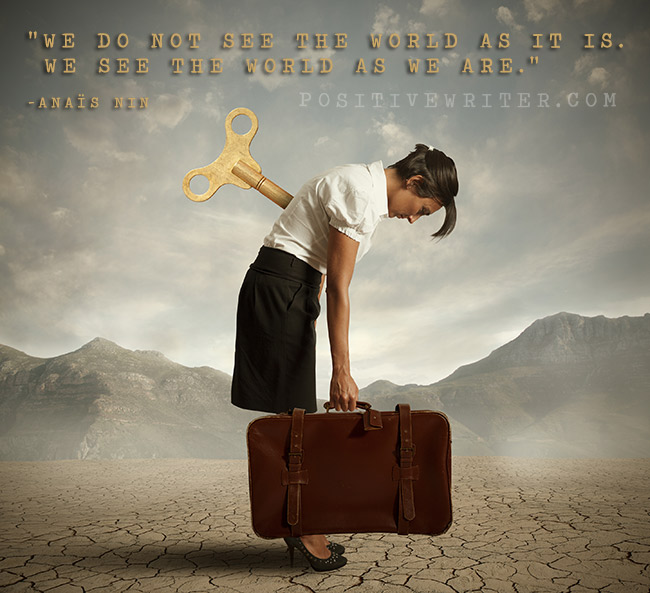Note: This is a post by Andy Mort, he is a UK based musician and writer. He’s the founder of SheepDressedLikeWolves.com, which is aimed at encouraging HSPs and introverts to embrace their creativity and push against the expectations of an often overwhelming world. Download his FREE eBook “The Gentle Rebel Manifesto.”
Pronoia is a concept I recently came across thanks to Beth Buelow who writes about it in her book, Insight: Reflections on the Gifts of Being an Introvert.
It is the opposite of paranoia; described as a suspicion that the universe is conspiring on your behalf rather than against you. In other words it’s a belief that the universe is a friendly place, not one that is harsh and unforgiving.
Victim of the Universe
I don’t know about you but if I’m not alert to it and I allow myself to drift I easily find myself in a default position in which I assume the role ‘victim of the universe’.
This is a view of the world in which my life doesn’t go as I plan, everyone else seems to be successfully pursuing their dreams, and I’m left wondering why I can’t ever seem to ‘catch a break’.
Apparently the flipside of pronoia…
I recently spent some time with an author friend of mine. He has had a couple of books published over the past ten years through a small traditional publishers and is now looking for another publisher to accept his new proposal.
I spent a long time listening to him lament the demise of the publishing business and jealously cursing the fact that it’s no longer just about the writing.
He was exasperated by the fact that before they will even consider you, publishers want to know about your social media following and the size of your email subscriber list.
The moaning persisted through resentment over the fact that no one reads his blog and that other writers who aren’t half as good are getting a hundred times the amount of traffic and social media engagement as he is.
Since his last book he has unfortunately done very little to actively build or nurture a platform or a loyal following.
So he seems to project his frustration outward on the world. He sees himself as a victim, unable to catch a break, expected to do more than he should in order to acheive his goals.
I became disappointed when he uncompromisingly and repeatedly declared that he didn’t see why he should compromise his integrity by conforming to these new soul-sucking demands, now adopted by the world of traditional publishing.
What’s your place in the universe?
As I reflected on this interaction I was reminded of what Beth wrote about ‘pronoia’.
I started to wonder whether pronoia, much like paranoia, isn’t something that is necessarily founded in a tangible reality; but is rather the result of a subconcious attitude towards the universe itself, and how you view your place in it.
“We do not see the world as it is. We see the world as we are.”
-Anaïs Nin (Click to Tweet this quote.)
A change of attitude can have a profound affect on how we interact with things. We often see what we want to see or what we believe is there; the pessimist sees the bad, the optimist sees the good, and their perception of reality is constructed on a reinforcement of viewing things through that lens.
We can often get caught up in negative cycles of thinking, especially when we compare ourselves to others or feel pressured to change and adapt to new ways of thinking.
When we feel like we’re being coerced into changes that feel alien, overwhelming and impossible to nagivate it is no surprise that we might start to get critical and defensive.
This is what my friend seems to be experiencing:
A bitterness projected from his fear of a changing world. And he is not alone.
For many artists across the creative industries this is a time of dramatic transformation and unsurety. We may feel in a state of limbo at the moment. The old industrial model has been ripped from beneath us thanks mainly to the Internet, and many people are simply waiting for something tangible and structured to pave the way forward.
However, as we learn and improvise our way forward, our negative projections and fear of the unknown can be unleashed on people who are ‘going for it’ in the form of negative criticism, which can in turn lead to self-sabotage and inaction.
We should try to be aware of this as we think about our attitude towards our work, the delivery of our art, and the way we interact with and percieve other people pursuing similar goals to us.
The Practice of Gratitude, Encouragement and Value-Giving
One of the points that my friend made was that he didn’t like seeing writers getting lots more engagement than he ever gets, on ‘poorly written’ blog posts.
And he put this down to the writers being clicy and exclusive; ‘you scratch my back and I’ll scratch yours’ when it comes to guest posting, sharing and promoting one another’s work.
He said ‘if you’re not on the inside you stand no chance’.
Again conviniently offsetting his apparent misfortune into the hands circumstances outside his control.
This provided the insight I was after; it became clear that he actually had a strange sense of ‘entitlement’, and had lost sight of writing as ‘a gift’. He saw this new kind of success as being built on transactions, i.e. ‘if you do this for me, I’ll do that for you’, and because of that the sacred art of writing was in jeopardy.
But this critique is little more than a distraction from what is becoming the new focus and key to success… building connection and providing value to the lives of their readers.
The surprising truth
We are in the age of the tribe. (Click to Tweet if you agree.)
We all face an exciting (and somewhat scary) opportunity.
We can sit down at a computer and within minutes reach and serve specific, real people who need and want to hear what it is we have to say.
When we find a message that reaches into the aspirations, fears, and experience of our readers, then we are on the right road. And I find that exciting.
When we have conversations about ‘platform building’ this is what we’re talking about. ‘Building your platform’ isn’t primarily about proving your popularity. Rather it’s about building connections with people, finding your tribe, and continuing to serve them with your unique message.
When we started talking through this idea, my friend had a bit of an ‘aha!’ moment, and began to understand this different way of looking at the pursuit of success.
Over to You: How do you feel about the idea of ‘building a platform’? Do you see it as an opportunity or a burden?
Share with us in the comments.
 IF you would like help building your platform and attracting an audience of readers, be sure to check out Jeff Goins’ Tribe Writers. Registration is currently open, but only for a limited time and for a limited number of students.
IF you would like help building your platform and attracting an audience of readers, be sure to check out Jeff Goins’ Tribe Writers. Registration is currently open, but only for a limited time and for a limited number of students.

